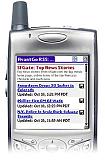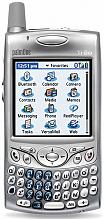Tue October 18 2005
 AvantGo adds RSS support AvantGo adds RSS support
|
|
07:32 AM by Brian in Archive | Handhelds and Smartphones
The new features give users greater ease-of-use for viewing mobile RSS subscriptions online or offline, and expands the content available through AvantGo by including the millions of RSS feeds offered by bloggers and major media. AvantGo users can now add any RSS feed to their account, without installing additional software, and then synchronize using a wireless or desktop Internet connection to receive the feed items in a format optimized for their device. If you're an AvantGo user, this new feature could be a welcome addition to help you stay up to date with news and information from your favorite websites and blogs. You can read more about the AvantGo For RSS service here. |
|
[ 2 replies ] |
Mon October 17 2005
 Mobisodes: Mobile Episodes of your favorite TV shows Mobisodes: Mobile Episodes of your favorite TV shows
|
|
07:10 PM by Brian in Archive | Portable Audio/Video
Read the full article here. Related: Mobile video about to explode, It's official: Video on your iPod Thanks to gadgetguru for the tip. |
|
[ 2 replies ] |
 Blackberry Connect coming to the Treo Blackberry Connect coming to the Treo
|
|
06:40 PM by Brian in Archive | Handhelds and Smartphones
Through RIM's BlackBerry Connect licensing program, Palm will enable its Treo 650 and future Palm OS(R) based Treo smartphones with secure, push-based wireless email via BlackBerry Enterprise Server(TM). The solution will enable the following: -- push-based email using BlackBerry Connect with Palm's VersaMail(R) email client; -- support for Microsoft(R) Exchange and IBM Lotus(R) Domino(TM); -- wireless calendar synchronization; -- remote address lookup of corporate email directory; -- convenient email-attachment viewing; -- Triple DES encryption; and -- IT policy enforcement and commands (such as remotely disabling or wiping email and PIM data from a device in the event it is lost or stolen). |
|
[ 0 replies ] |
 20 GB Creative Zen Media Center is $200 at Buy.com 20 GB Creative Zen Media Center is $200 at Buy.com
|
|
10:29 AM by ignatz in Archive | Portable Audio/Video
|
|
[ 4 replies ] |
 Boston Globe says the PDA not dead yet Boston Globe says the PDA not dead yet
|
|
08:29 AM by Bob Russell in Archive | Handhelds and Smartphones
|
|
[ 0 replies ] |
 Nokia bringing KDE to your phone Nokia bringing KDE to your phone
|
|
08:02 AM by Bob Russell in Archive | Handhelds and Smartphones Slashdot says today that "KDE could soon be making its way into your mobile phone. At aKademy in August David Carson and Deepika Chauhan from Nokia presented the work they've done in integrating KDE components into the latest version of the company's mobile phone software. Philip Rodrigues discusses this work with them on dot.kde.org." |
|
[ 2 replies ] |
 Editorial: Where are the intelligent handhelds? Editorial: Where are the intelligent handhelds?
|
|
06:08 AM by Brian in Miscellaneous | Lounge
As Evan Light at Palm Addicts points out in a recent Associate Writer Thought, we're starting to see more "smart" features and applications for our smartphones and PDAs, and the upcoming Treo 700w has one example - a "friendly SMS": "The 700w boasts a powerful and yet simple feature: the ability to, in a small series of button presses, allow you to ignore a call and SMS the caller that you're busy but will get back to them." While this is going in the right direction, we should expect and demand even more intelligent features in the future. How, when, and where will intelligence come into play, and who will be the innovator to bring it to us? Here are a couple of areas where improvements can and will be made, and I'll discuss more in a future article. Putting everything into context Context is an important and powerful concept in human-computer interaction, as it is in our social interaction and perception of the world. Who, what, where, why, when, and how are all important pieces of "metadata" that help us put information and events in the proper context. Software applications and services that have context awareness operate using information about context and react accordingly. The goal is to create a computing environment that is much more seamless, convenient, relevant, and intuitive for the user. A recent article at EContentMag.com about the MIT Media Lab's Reality Mining Project provides a glimpse at how patterns and context can be used to make more intelligent applications for our smartphones and PDAs that predict our behavior and react accordingly: "If your cell phone knew what you were going to do at two o'clock, would that change how you planned your day? If your cell phone "predicted" correctly where you would be at a particular time of the week, how would you feel? No longer hypothetical situations, the Reality Mining experiment answers these questions." GPS receivers will soon become a common feature in handhelds and smartphones, but mapping, navigation, or "location aware" advertisements won't be the killer applications. Where you go on a daily basis, and what you do while you are there as well as everywhere in between are important pieces of contextual information that can be used in intelligent applications. It would be nice to have a device recognize where you are, what your patterns of usage are, and then present information in a more meaningful way and in the proper context. What applications do you use most often at home, and when do you use them? What do you do in the morning before work, when you get home, or on weekends when you don't work? How could his information be used? The article about MIT's Reality Mining project provides a few hints. "According to data collected by Eagle and his staff, 35% of the subjects used their phone's clock application regularly, yet opening the clock application on the phone involved 10 keystrokes. The data showed that people who used the phone's clock application used it at their homes rather than at work." Here are some other examples - use them as a guide and then use your own imagination about other possible scenarios.
How? Intelligent features like those in the Newton's "Intelligent Assistance Architecture" as well as the examples mentioned above will come through software that can accurately recognize patterns, make predictions, and understand context. It just so happens that Jeff Hawkins, one of the minds behind the original Palm Pilot, the Handspring Treo, and who no doubt has a hand in Palm's "third business", is interested in understanding human intelligence and has created a software company called Numenta. His latest startup, which was also co-founded by Donna Dubinsky, is working to commercialize and license technology with "real intelligence" based on the research going on at the "Our products are a set of tools that allow you to configure these memory systems, which we call HTM, hierarchical temporal memory. You can interface them with a thing like a camera or a microphone or sonar and it learns about its environment in the same way you learned about your environment when you were a child. It can model the environment, recognize things in it and make predictions about the future. What we're building is actually a platform. It's like a new type of operating system. It's a platform on which people can use our tools to create new applications for solving different types of problems." As Palm's Chief Technology Officer and the co-founder of Numenta, Jeff Hawkins splits his time between the two companies, a fitting arrangement when you consider his passion for both handheld computing and creating intelligent machines. If his two passions don't influence one another and Jeff Hawkins doesn't plan on combining the two - handheld computers and intelligence machines - I would be extremely surprised and disappointed. Will this mean that Palm could become a licensee of Numenta Technology at some point in the future and Palm's mobile computing products will become much more intelligent? Once Numenta's technology becomes ready for commercialization, it would be logical for Palm to become a licensee. I can't predict the future, so only time will tell. In the meantime, expect more context aware applications, like the Treo 700w's "friendly SMS", to be added to Palm's products. What intelligent features would you like to see for your PDA or smartphone? Please post your thoughts and ideas about intelligent handhelds. |
|
[ 13 replies ] |
Sun October 16 2005
 Put the home back on your Palm T|X Put the home back on your Palm T|X
|
|
11:09 PM by Bob Russell in Archive | Handhelds and Smartphones
|
|
[ 5 replies ] |



 The New York Times has an
The New York Times has an 
 Buy.com is offering a $250 rebate on the
Buy.com is offering a $250 rebate on the  According to the Boston Globe, it's not completely about smartphones. Author Michelle Johnson describes the new Palm devices and shows how they still meet consumer needs with non-phone devices. Take a look
According to the Boston Globe, it's not completely about smartphones. Author Michelle Johnson describes the new Palm devices and shows how they still meet consumer needs with non-phone devices. Take a look  In a recent
In a recent  Latest E-Books
Latest E-Books


